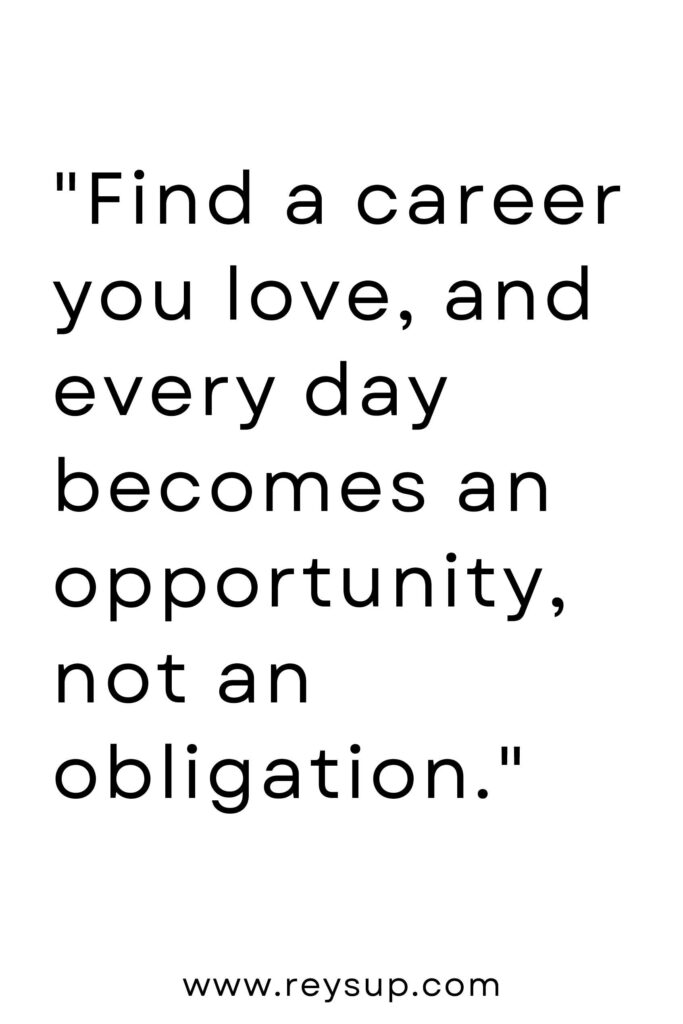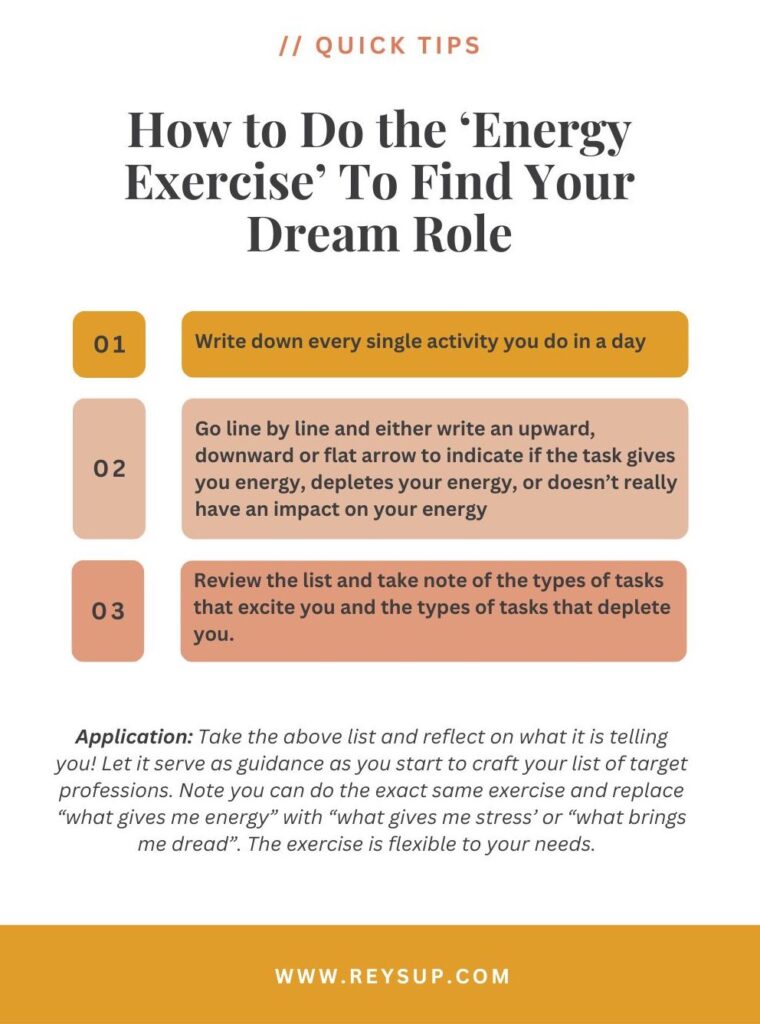Self reflection can uncover what it is you want out of a job (and life)! In this article, we share crucial steps you should take to discover your career aspirations and live your dream life.

To find the career you love, you first need to self-reflect
The path to finding your dream career involves introspection, honestly, and a lot of planning. But the good news is that all of these things are completely in your control and if you take the time to master them, you will be well on your way to building the life of your dreams.
For introspection to be effective, you need to make sure that you are asking yourself the right questions. These questions should help you identify your motivations, strengths, interests, and non-negotiables in a job. This article will guide you through the process step by step, and provide you with the questions you will need to ask yourself to define your ideal career path.

Step 1: Assess What Motivates You
Uncovering what motivates you is a crucial first step in finding a fulfilling career. Personal motivations can be categorized into two buckets: intrinsic (driven by internal rewards like the desire to learn) and extrinsic (driven by external rewards like higher pay). If you can identify which type of motivation drives you the most, you can then start to craft a career path that aligns with your values and desires.
A Deeper Look At Intrinsic Motivators
An intrinsic motivator is something that drives you to do an activity because you find it personally rewarding and enjoyable, not because of external rewards like money or praise. Some examples of intrinsic motivators include a desire for personal growth, a passion for learning, a sense of accomplishment and bigger purpose, or the need to help others.
Questions to Ask Yourself To find Your Intrinsic Motivators
- What types of tasks or projects make me lose track of time because I am so engaged in them?
- By answering this question, you reveal activities that you inherently find rewarding and enjoyable.
- When have I felt the most fulfilled and satisfied at work?
- Try to focus on specific moments or achievements in your current work life that have brought you a deep sense of satisfaction.
- What kind of work makes me feel proud and accomplished, regardless of if I get external recognition?
- Try to focus on work that you do where you do it because you love it, not because someone is telling you to do it. What do you naturally find yourself gravitating towards?
- What activities at work align with my personal values and passions?
- Reflect on work that you do in your current role that specifically resonates with your core values as a human being. If you care about something outside of a work environment, you will naturally care about it (and gravitate towards it) inside of a work environment.
- What aspects of my job make me excited to get up and go to work each day?
- A similar question to the above but a slight reframe. Think about yourself waking up each morning. What are the parts of your day that get you excited and motivated to get ready for the day?
Once you have your intrinsic motivators, you can then align those with potential role types.
- Entrepreneurial Roles: Consider roles like these if you are most motivated by creative freedom or opportunities for personal growth. These positions will allow you to express your creativity and continuously develop your skills.
- Non-Profit Roles: Consider roles like these if you are most motivated by helping others or fighting for a greater cause. These positions will give you the opportunity to make a meaningful impact and will align with your passion for making a difference.
- Sales Roles: Consider roles like these if you are most motivated by solving problems for others or tackling challenging situations. These positions will allow you to leverage your problem-solving skills and provide you an environment where innovative thinking is required.
- Human Resources Roles: Consider roles like these if you are most motivated by helping employees and shaping broader company culture. These positions will enable you to engage with people daily and give you the satisfaction of being able to influence your company’s team and morale.
Once you have aligned on the role types, you can search LinkedIn or BuiltIn to find open roles in your area.
A Deeper Look At Extrinsic Motivators
An extrinsic motivator is something that drives you to do an activity because of external rewards or pressures, such as money, recognition, or avoiding punishment. Some examples of extrinsic motivators include salary, recognition, job security, status, and personal brand.
As an aside, extrinsic motivators can sometimes get a bad rep, because to some they seem like selfish, self-serving things. At ReysUp, we believe in embracing extrinsic motivators and being vocal about them with future employers. To us, having extrinsic motivation is part of being a human being, and if you show this side of yourself, you come off as more genuine and authentic to a potential employer .
Questions to Ask Yourself To Find Your Extrinsic Motivators
- What job benefits and perks are most important to me?
- Would a lack of job security or a salary that doesn’t meet my expectations affect my motivation and well-being on a daily basis? If job security and salary aren’t major factors, what is the key thing that would diminish my motivation to come to work?
- In my current work situation, how do I feel about receiving recognition or public praise? Does it motivate me to work harder, or does it have little impact on my drive?
Once you have your extrinsic motivators, you can then align those with potential role types.
- Financial Analyst: Consider roles like these if you value high earning potential and job security.
- Marketing Analyst: Consider roles like these if you value recognition through successful campaigns.
- Sales Manager: Consider roles like these if you value public recognition and financial rewards through sales achievements.
Step 2: Assess Your Strengths & Weaknesses
After you have gone through the exercise of mapping out your intrinsic and extrinsic motivators, the second step is reflecting on your strengths and weaknesses. Because after all, it’s not enough to just be motivated to do something. You also have to have the capacity to do the thing, and do it well. Below are some of our favorite self-reflection questions to find a career you love. We’ve categorized common strengths and weaknesses into the key areas typically found within the business and tech industries.
Assessing Your Analytical and Problem-Solving Skills
On a skill of 1-10, rate yourself along the following questions. If your average score is higher than 7, you should consider the career listed at the end of the section.
- Questions to Ask
- How good am I at solving complex problems and analyzing data?
- How good am I at making data-driven decisions?
- How good am I at looking at vast sets of data and telling a story with what I see?
- How good am I at handling tasks that require extreme attention to detail?
- How good do I perform in situations where I am given a task with unclear instructions and need to figure out a path to resolution with limited guidance?
- Recommended Professions
- Data Scientist: Strong analytical skills required for data interpretation.
- Business Analyst: Analyzes business processes and suggests improvements.
- Actuary: Uses statistical methods to assess risk.
Assessing Your Communication Skills
On a skill of 1-10, rate yourself along the following questions. If your average score is higher than 7, you should consider the career listed at the end of the section.
- Questions to Ask:
- How good am I at presenting ideas and persuading others?
- How comfortable am I with public speaking and writing reports?
- How effective am I at conveying information clearly and concisely?
- Recommended Professions
- Public Relations Specialist: Requires excellent communication skills.
- Corporate Trainer: Effective in delivering training sessions.
- Sales Manager: Persuasive communication is key to sales success.
Assessing Your Relationship-Building Skills
On a skill of 1-10, rate yourself along the following questions. If your average score is higher than 7, you should consider the career listed at the end of the section.
- Questions to Ask:
- How much do I enjoy networking and building professional relationships?
- How well do I collaborate with others?
- How good am I at resolving conflicts and fostering teamwork?
- Recommended Professions
- Client Relationship Manager: Builds and maintains client relationships.
- Human Resources Specialist: Facilitates positive employee relations.
- Project Manager: Coordinates team efforts to achieve project goals.
Step 3: Assess Your Energy Levels With Your Current Daily Activities

After you have assessed your motivations and skills, it’s time to take your self-reflection one step further and perform what we call at ReysUp an ‘energy exercise’. This essentially involves reflecting on your current day-to-day activities in your role and ranking your energy level alongside that task. It’s another way to determine what you love and hate about a role and what kind of daily routine you are looking for.
Read 13 Impressive Questions to Ask In An Interview
Steps to Take
- Write down every single activity you do in a day
- Go line by line and either write an upward, downward or flat arrow to indicate if the task gives you energy, depletes your energy, or doesn’t really have an impact on your energy
- Once complete, review the list and take note of the types of tasks that excite you and the types of tasks that deplete you.
Application
Take the above list and reflect on what it is telling you! Let it serve as an additional layer of guidance as you start to craft your list of target professions. Note you can do the exact same exercise and replace “what gives me energy” with “what gives me stress’ or “what brings me dread”. The exercise is flexible to your needs.
- Energizing Tasks: If you thrive on brainstorming sessions and creative problem-solving, consider roles in marketing, sales, or product development.
- Draining Tasks: If routine administrative tasks exhaust you, you might want to avoid roles that are heavily focused on these activities like project management or data analysis.
Step 4: Identify Your Interests
Your natural interests can guide you towards industries or problems you are passionate about, which in turn will lead to your job satisfaction.

Questions to Ask
- What topics do I naturally gravitate towards in my free time?
- What industries or world issues am I passionate about?
- What types of books, articles, or media do I consume most frequently?
- What hobbies or activities do I enjoy outside of work?
Application
- Interested in technology? Consider roles in tech companies or startups.
- Passionate about sustainability? Look for positions in environmental organizations or companies with strong sustainability practices.
- Fascinated by finance? Explore careers in banking, investments, or financial planning.
Step 5: Define Your Non-Negotiables
This is an important step and it’s important to not skip it. As important as it is to identify what your interests are, it’s equally important to state out loud what you don’t enjoy. This will help you set clear boundaries and priorities and ensure you choose a career that aligns with your values and lifestyle preferences.
Questions to Ask
- What work-life balance do I need to feel content?
- How important is job location and remote work flexibility to me?
- What salary and benefits are essential for my financial well-being?
- What type of company culture do I thrive in?
- Are there specific industries or companies I want to avoid or are morally opposed to?
Application
- Work-Life Balance: If you prioritize work-life balance, look for companies with flexible hours or remote work options.
- Company Culture: If you value innovation and creativity, seek out companies known for their dynamic and progressive cultures. By the way, if you want to learn more about how to suss out a company culture, make sure to check out our article here on how to host an informational interview with a current employee.
Step 6: Envision Your Future
The last step of self-reflection involves thinking far into the future and trying to picture the person you want to be. This is a trick that psychologists use a lot in therapy, and we believe the application is relevant when career planning. By identifying who you want to be, it’s easier to determine where you need to go in the short term to eventually achieve that longer term vision.

Questions to Ask
In 10 years:
- What kind of company am I working at?
- What kind of work does our company do? What specific problem are we solving?
- What specific role am I in? Do I manage people or am I an individual contributor?
- What does my company culture look like?
- Who are the people I want to work with or for?
- What does the team that I lead look like?
Application
- Role and Responsibilities: If you see yourself as a CEO, start by gaining experience in leadership roles and seek mentorship from current executives.
- Work Environment: If you envision a collaborative and innovative workspace, look for companies with a strong team culture and opportunities for creative input.
- Action Plan: Map out the steps needed to achieve your goal, such as obtaining relevant certifications, building a professional network, or gaining experience in specific areas.
Conclusion
At ReysUp, we are huge fans of thorough and deliberate self-reflection. It is so important for us as career individuals to consistently take a step back and evaluate where we are, where we want to go, and where we don’t want to go. By leveraging these steps to self-reflect and find a career you love, you will be able to more clearly paint your personal path for your dream career and most fulfilled life.




